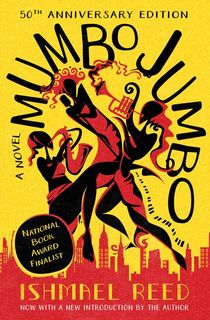Ishmael Reed is a Black writer who has been sharing his incredible talent with the world since his first novel, The Freelance Pallbearers, was published in 1967. But Reed’s work goes far beyond just penning novels—he also writes as a non-fiction author, poet, essayist, songwriter, and playwright/librettist. Lauded for his satirical takes on American culture, Reed breathes life into stories centered around African and African American characters and their unique and often ignored perspectives and cultural backgrounds.
Though it’s his novels that garner the most notoriety of his works, Reed finds much of his inspiration from poets rather than authors. Primarily, Reed cites the influences of Harlem Renaissance and Beat poets. This lyrical and poetic nature is tangible in his fiction—his words are filled often with surprises, raw honesty, and just as many shocking, discordant clashes as there are delicious connections and parallels.
Related: 26 Must-Read Books by Black Authors
Reed has a long list of honors and awards under his belt, most notably including two nominations for a National Book Award and a nomination for the Pulitzer Prize for his collection of poetry, Conjure. He was also awarded the ADELCO Pioneer Award for the Theater, as well as the Langston Hughes Medal and the John D. and Catherine T. MacArthur Foundation Fellowship—often referred to as the “genius” grant. His 1972 novel Mumbo Jumbo has been ranked by literary critic Harold Bloom as being one of the 500 most important books of the Western canon.
Mumbo Jumbo stands as Reed’s best-known work, thriving in America and spawning translations of the novel into French, Italian, Japanese, Spanish, and Chinese editions to reach a global market. The story takes place in New York City in the 1920s and follows PaPa LaBas, an old houngan—or Haitain Vodou priest—in Harlem. PaPa LaBas, alongside his ally Black Herman, struggles against the efforts of an international monotheistic conspiracy known as the Wallflower Order as they seek to eradicate the “Jes Grew” virus. This virus infects black people with a dancing craze, and is typically spread by particular black artists—functioning within this work as an allegory for ragtime, jazz, polytheism, and freedom.
The realism of this book—the living breathing elements of history—meld seamlessly with the fantastical and, at points, absurd. Papa LaBas’ own ally, Black Herman, is actually a historical stage magician, otherwise known by the birth name Benjamin Rucker. Figures such as W. E. B. Du Bois, James Weldon Johnson, and Irene Castle also make appearances in the novel. It’s this blending of reality and farce that elevates such things as PaPa LaBas’ recount of The Bible’s history, transforming the understanding of the text’s past to include religious figures like Osiris and the prophet Moses who is understood here to be a black man.
Related: 10 Unapologetic Books About Race in America
Mumbo Jumbo—as well as Reed’s other works—is a piece of writing which breaks down barriers. These are literary barriers which Reed transcends with his mash up of semi-historical fiction, highly stylized formatting conventions more commonly found in movie scripts than novels, and the spiritual, mythological, and mystical elevation of his own text. But these are also cultural barriers—neglect, condescension, and control put in place by systemic oppression—which Reed pushes to disintegrate.
More of Ishmael Reed’s awe-inspiring and culturally uprooting novels include Flight to Canada, a parodied rebuttal to the classic and conventional anti-slavery novels such as Uncle Tom’s Cabin. In his more recent novel, Juice, Reed provides commentary on the media frenzy that followed the controversial O.J. Simpson trial, and how the man himself has come to be viewed as a living metaphor for wrongdoing.
For an example of his influence in the non-fiction genre, Reed’s Why No Confederate Statues in Mexico addresses how the Confederate generals of the Civil War earned their accolades by slaughtering black, Mexican, and Native American people—including children.
Today, Reed is still publishing works that are highly culturally relevant. His latest play, The Haunting of Lin-Manuel Miranda, is set to be released this fall, and is available for pre-order now. This work acts as both a celebration and critique of the Broadway phenomenon Hamilton. The play has recently had a second boom of popularity with the addition of a professional recording added to the Disney+ streaming service—and, in the wake of recent Black Lives Matter protests, has received criticism for glossing over slavery's role in the founding of America. Reed’s gripping drama, lauded as “a cross between A Christmas Carol and a trial at The Hague’s International Criminal Court,” demands justice and a radical change in how we regard history.
Publications like The Buffalo News refer to Ishmael Reed as “the purest literary troublemaker we currently have.” While this opens Reed up to large amounts of criticism and increased marginalization, it also makes him a force of powerful change. Whether it’s popular Broadway/Hip-Hop titans like Lin Manuel Miranda and Hamilton, or other cultural icons like Quentin Tarantino and Donald Trump, Reed is never afraid to speak his mind.
In a world where so much of our media—from the relentless movie remakes to the unwanted and tone-deaf book prequels and sequels—Reed’s work has always dared to break the mold. For a breath of fresh air and the first step towards radical re-thinking, there is no better author to immerse yourself in than the transcendent works of Ishmael Reed.
Keep Reading: What White Fragility Gets Wrong, and 5 Books to Read Instead
Featured photo, from left to right: writer Bob Callahan, Ishmael Reed, Reed's wife Carla Blank, and novelist Shawn Wong, 1975. Credit Nancy Wong / Wikipedia



